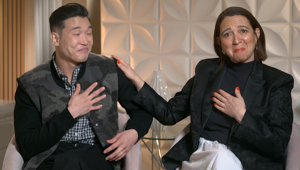
“In the face of disaster, we have entertainment.”
So says Sean Hayes, waxing philosophical in the midst of the COVID-19 outbreak. Hayes, of course, has a reputation for making the world laugh, having achieved megastardom as the flamboyant Jack McFarland on Will & Grace for 11 seasons, and for which he won an Emmy Award. In addition to his work on the sitcom, Hayes boasts an impressive theatrical resume, having appeared on Broadway in An Act of God and the musical Promises, Promises, for which he earned a Tony Award nomination.
With the final season of Will & Grace (allegedly…we’ve heard that one before) in the can, Hayes embarks on his latest career gamble. This April 3, he stars in Lazy Susan, a film which he also co-wrote. Hayes plays the title character: a middle-aged woman stuck in a teenage mentality, constantly mooching money off her family, shopping at K-Mart and living on blended ice cream drinks. When she meets a handsome man (Jim Nash), Susan finds renewed purpose in life, even as her mother (Margo Martindale) cuts off her finances. Can Susan find a way to survive adulthood, or will her laziness prove her undoing? Lazy Susan also stars Matthew Broderick and Oscar-winner Allison Janney.
To reiterate: yes, Sean Hayes plays a woman. We grabbed some time with the actor to talk about the origins of Susan, why he wanted to play a female character, and the oddball humor that fuels the film. Lazy Susan comes to streaming April 3.
How about we take this to the next level?
Our newsletter is like a refreshing cocktail (or mocktail) of LGBTQ+ entertainment and pop culture, served up with a side of eye-candy.
So this is an unorthodox project, to say the least. Where did Susan come from for you?
Wait, what do you mean by unorthodox?
Well, unorthodox in the sense that this isn’t a drag performance, at least in the traditional sense. You’re playing a woman quite sincerely. The fact that you’re a male actor playing a female character isn’t used as a joke.
Right. The idea came from when I was 21 years old and living in Chicago. I got a call from my agent to come audition to replace “the white guy” on In Living Color.

So Jim Carrey?
Which was Jim Carrey. So I went down with a bunch of characters: men, women, costumes, wigs, ideas. And one of those characters was Susan, this lazy, disgusting girl which made me laugh. And I’m still waiting to hear if I got the part.
[Laughter]
So here we are decades later, and a friend suggested that I do something with the character Susan. She came up with the title Lazy Susan. And I thought it was an interesting title, and that I should work backward from there. The obvious thematic motif of someone spinning around in circles with their life who can’t figure themselves out was quite interesting to me.
Sure.
It actually started as a TV pilot, and I showed it to my friends Darlene [Hunt] and Carrie [Aizley] who co-wrote the movie with me. We were all kind of like this is a first act. And so we created the film. To me, Susan is a character. I wanted the challenge of playing something different. Being an actor is all about stepping into the skin of other people, and the challenge of that, and the reward of that, personal or otherwise.
Right.
So I didn’t want the joke to be me dressed as a woman. I wanted the joke to come from this character. That’s why her make-up is understated. Her hair is understated. The way that she moves and thinks is understated, otherwise, it would have been something we’ve seen before.
And we’ve already alluded to this, but this is not I would call a drag performance. You’re playing a woman, period. I was trying to think of other movies where a man plays a woman. Obviously, Hairspray.
Well, that’s another reason why I wanted to do the movie. I personally have never seen a film where a man has played a woman like this.
I can think of a few movies where women play men, but a man playing a woman is rare.
I mean we’ve seen Tootsie and Mrs. Doubtfire, but the joke is—and stopped at—a man is dressed as a woman. It’s played for laughs. But I wanted to go one step further and get genuine character laughs.

No. The movie never plays the joke that it’s a man dressed as a woman. Which is interesting and ballsy, if you’ll pardon the expression.
[Laughter]
That’s f*cking hilarious.
So how does that affect your choices as an actor—playing her sincerely rather than for camp?
There isn’t [a difference], as long as you approach each character through that character’s reality. Human beings have sex, so in the movie Susan has sex. I didn’t think of it from a man’s point of view or a woman’s point of view. This is a person, a human being, a woman who has sex. It’s the same way I approach every character. The thing is, I’m probably most famously known as Jack from Will & Grace. But to me, I love to play characters that challenge me. There’s nothing personally pleasant for me dressing up as a woman. I don’t judge anyone who wants to, but I don’t want to do it again.
Ok.
But that’s what I loved about it. I like the challenge of making myself uncomfortable in other people’s skin and acting like I’m not.
I love that. Obviously, entitlement and laziness are themes in the movie, far beyond Susan.
Oh yeah.
This is particularly evident with Susan’s friend Corin’s husband. He is always expecting her to do something he doesn’t want to do. But the movie doesn’t really comment on it beyond just showing it. For you as the writer, is that a comment on sexism and gender? Is that a comment on Americana? We kind of like to be lazy.
That’s an interesting question. The character is based on a few people that I have known—men and women—that have these kinds of characteristics. Not to beat the motif of the lazy susan in your head, but they’re spinning out of control of their lives. I think that is true for a lot of people, not necessarily Americans, but the cliché is that Americans are lazy. We hear that from other countries: that is the perception of America.

Sure, yeah.
But I think it’s more about individuals, not Americans, that can’t get their lives together. That search for excuses, that do not grow up and take on responsibility. So I’ve known a lot of people like that. I’m the opposite of that, to the extreme. It’s one of my biggest faults as well. I’m too ambitious sometimes. So I liked playing the opposite of that, the challenge.
I’m tempted to ask what you’re too ambitious about. That’s a provocative thing to say about yourself.
What am I ambitious about? I’m Type-A all the way. I like things neat. I make goal lists. I like reaching goals, and when I do, I like thinking of others. Those are goals for life, with people, in business, humanity, whatever the goals are. I like setting them and reaching for them, which is the complete opposite of Susan. That’s comedy; while sad, I find those people funny. Also, I wanted to create a tone that I used to love in films like Welcome to the Dollhouse or Napoleon Dynamite, which was completely character-based. Now it seems like film festivals open with the “independent film” Joker.
Related: Sean Hayes plays a middle-aged, cisgender woman in his latest film
Right? Oh my lord.
What happened to little independent films that found an audience, that were given an opportunity to be curated through a system that supported these kinds of films? That air is kind of gone. I missed that. That’s why the tone feels retro and contemporary at the same time.
That’s interesting. The Todd Solondz comparison—the writer/director of Welcome to the Dollhouse, Palindromes, Happiness—isn’t one I had thought of. But in a similar sense to Lazy Susan, his movies are kind of meant to be funny at times, but the humor is so twisted. You never know to laugh or cringe.
I love that. And that’s the biggest compliment I could ever have.
Fantastic. The other intriguing element about Susan is that she’s an intelligent person, despite all her stupid choices. There’s an insinuation that there’s something stunted about her—she seems trapped in her 80s high school girl mode. This is a recurring theme in a lot of different media right now—films, TV etc. The Gen X thirst for 80s nostalgia. Where does that come from? I mean you’re Generation X.
I have no idea? Is that my generation?

Well, you’re not a boomer.
No, I’m not a boomer.
[Laughter]
So what’s with Generation X and this sort of arrested development, and this obsession with the 80s?
That is such an interesting question. I talk about that all the time. I have the same question, by the way. I don’t have an answer for you. It seems on the surface to be the time for firsts, right? The first time we saw technology and feature films merge with ET or Star Wars or Jurassic Park—big popcorn movies that are part of our souls. So when Stranger Things happened, people go oh my God, it’s everything I felt as a kid, and I can feel it again. But we keep hearkening back to that because it seemed to be a carefree, fun time. The world, perceptually, has become a much darker place as evident by living through this pandemic.
Right?
So I think it’s a longing for a “better” time. It just seemed like less dire times.
Which is weird for me to think about. The 80s were not paradise. The racial injustice, AIDS, all of that…
Right, but it was offset by music and film and television and other forms of entertainment with this happy, carefree feeling. So I think there was more to offset the darkness in the 80s, whereas now entertainment seems to reflect the times we live in.
That’s true. I would add to that: 80s entertainment was very squeaky clean, very escapist. Everything had that Spielbergian, suburban glow to it. But it’s the entertainment that endures. Nobody wants to go back and hear the stories about AIDS or the Central Park Five.
Right. That’s interesting to talk about.
You’re working with some very heavy hitters here: Allison Janney, Oscar winner. Matthew Broderick, Tony winner. Margo Martindale, one of the most underrated actresses alive.
She’s one of the best actresses to live. Ever. Very rarely—and this is the complete honest truth—when you write something, you have people in mind. Rarely when you write a scirpt are you able to cast the people you had in mind when you wrote it. To this day I cannot belive that we got Margo Martindale, Jim Rash, Matthew Broderick, Allison Janney. Every single person is who we wrote it for.

Wow.
All these people said yes. It’s bizarre. We didn’t even have to go through like 20 people
How did you seduce them into joining this project?
I asked them and sent them the script. We talked about the movie, and that I would be in it with them. You’d have to ask them. I’m just fortunate they said yes.
How does working with someone of their caliber make you up your game as an actor?
It’s interesting. Going back to Margo, I think I wrote it for her because she has this glorious lower register to her voice. [I am] a man playing a woman as Susan. So I thought that match would make a believable pairing. How do I up my game? I do the best I can. These actors are some of the best that have ever lived. So I just try to learn from them and create a rhythm with them and keep up.
You’re someone who has been very frank about the way fame puts undue pressures on you, particularly as a gay man. You weren’t comfortable coming out in the press when you started Will & Grace. How does the strong association between you as a gay man in real life, and as someone who has played such an iconic gay character had on your career when you’re trying to play something else?
Why would I put that kind of stress on me? I don’t. I’m an actor. I’m gay.
But how does the business react?
I don’t know. A lot of the time I create things for myself. I don’t stop and think what the business thinks about me. If I did, I probably wouldn’t come out of my house. I would just stop. The business is the business, and everybody, now more than ever, doesn’t know where it’s going. So I make things that matter to me, release them, and move on to the next thing that matters to me. I don’t think about being gay. I’m an actor, and I’ll play parts that I think I can do. Larry in The Three Stooges, or Mr. Humberfloob in The Cat in the Hat…I love creating people. I don’t talk like Larry, but I love creating that. I don’t think about being gay when it comes to my craft.
I’d say that’s healthy. At the same time, we’re living in this era of social media, of Instagram where everyone is a brand. Everyone has to show off every aspect of life from what they’re eating to who they’re hanging with. It’s overwhelming. So for you, the celebrity, how do you find the balance?
It depends what day of the week you ask me. Today…the business is always changing, and you have to change with it. Part of that is playing the game of social media. We’re told it matters, I guess. So I guess it does. So sure, why not take a moment to shout out to fans and people that support what you do? They’re owed it, so why not?

So the corollary to that: where do you find the balance between someone’s need to represent and someone’s privacy? Do queer performers have a duty to represent that element of their personal lives as part of “the brand?”
I think it’s case by case. Everybody’s different. For me I don’t feel a need to do anything, but I don’t mind sharing my personal life. It’s unavoidable; it’s been unavoidable for people in showbiz for the last 100 years. Everybody wants to know about your personal life. It’s just that now everybody has more access to your personal life. So, yeah, they don’t know everything about me. Some things you have to keep for yourself. But why not share it? We’re all on this Earth for five minutes, so why keep things from people? Sure, certain things, and everybody balances that differently, but for me, I don’t really care.
So what’s next for you? Are there roles you’re really gunning for on stage or screen?
Yeah. There are two. One is Q-Force, which is an animated show on Netflix. It’s sort of a gay James Bond. The cast is going to blow your mind, but I can’t say anything now.
When does it premiere?
God knows since everything stopped. It was slated for Summer 2021. Then I’m also playing Oscar Levant, George Gershwin’s best friend. He was a straight guy, married, kids, insane, an incredible pianist. It’s written by Doug Wright, who won the Pulitzer Prize for I am My Own Wife and wrote Grey Gardens and Quills. He’s incredible. I’m so lucky that I get to be in something he wrote. Leigh Silverman is directing and Beth Williams & Barbara Whittman are producing. That premieres at the Goodman Theatre this winter. If all goes well, we’ll be on Broadway.
Lazy Susan debuts on Amazon, VUDU & iTunes April 3.
This article includes links that may result in a small affiliate share for purchased products, which helps support independent LGBTQ+ media.




















Joshooeerr
Literally every sentence uttered in this interview – by both the interviewer and Hayes – is monumentally misguided and deluded. It’s staggering to think this movie actually got made and it’s clearly going to be torn to shreds – and rightly so.
MISTERJETT
some people try so hard to be that stereotypical bitchy queen, don’t you?
Hdtex
@Joshooeerr you can literally STFU and no one would know the difference.
LumpyPillows
Cancel-culture Josh trashing a movie he hasn’t even seen. Sad. Pathetic. LAZY.
curiobi
I love the interview series you guys have, they are always a joy to read!
I actually saw this trailer a while ago and I can’t wait to see the movie because while rom-coms and non inclusive casts are not my thing, I just can’t get over how oddly fascinating Sean is as a woman!
I just can’t look away, it may be hilarious or a train wreck but either way I have to watch it because it feels like Sean’s Will and Grace character Jack is genderswapped!
😀
ScottOnEarth
I’m looking forward to this movie! Sean Hayes is so hilarious and I love that he didn’t want this to be a sight-gag movie….and ANYTHING with Allison Janney is a must-see.
billybobs
Loved it simple and entertaining right down to the granny panties touch of camel toe and the love making scenes hilarious Allison and Sean could be sisters in the movie
Jerry
Watched it yesterday, hilarious and heartbreaking. Loved it.
PLAYS WELL WITH OTHERS
Countdown til in this insane PC world some will slam this movie for “unjustified robbing a woman of a role they deserved” 🙂
tominchicago
“And we’ve already alluded to this, but this is not I would call a drag performance. You’re playing a woman, period. I was trying to think of other movies where a man plays a woman. Obviously, Hairspray.
Well, that’s another reason why I wanted to do the movie. I personally have never seen a film where a man has played a woman like this.”
Surprising that neither of them mentioned Louie Anderson’s portrayal of Christine Baskets. Granted, not a movie, but one of the finest performances in recent years.
Kangol2
That’s so wild that just as I was posting you also pointed to Louie Anderson on Baskets. He really gives quite a performance.
Kangol2
I am fascinated by Sean Hayes playing a woman in this movie. Louie Anderson also plays a woman–and quite well, I’d add–in the TV show Baskets.
cthomas59
where can you watch this from? which streaming service? Thanks